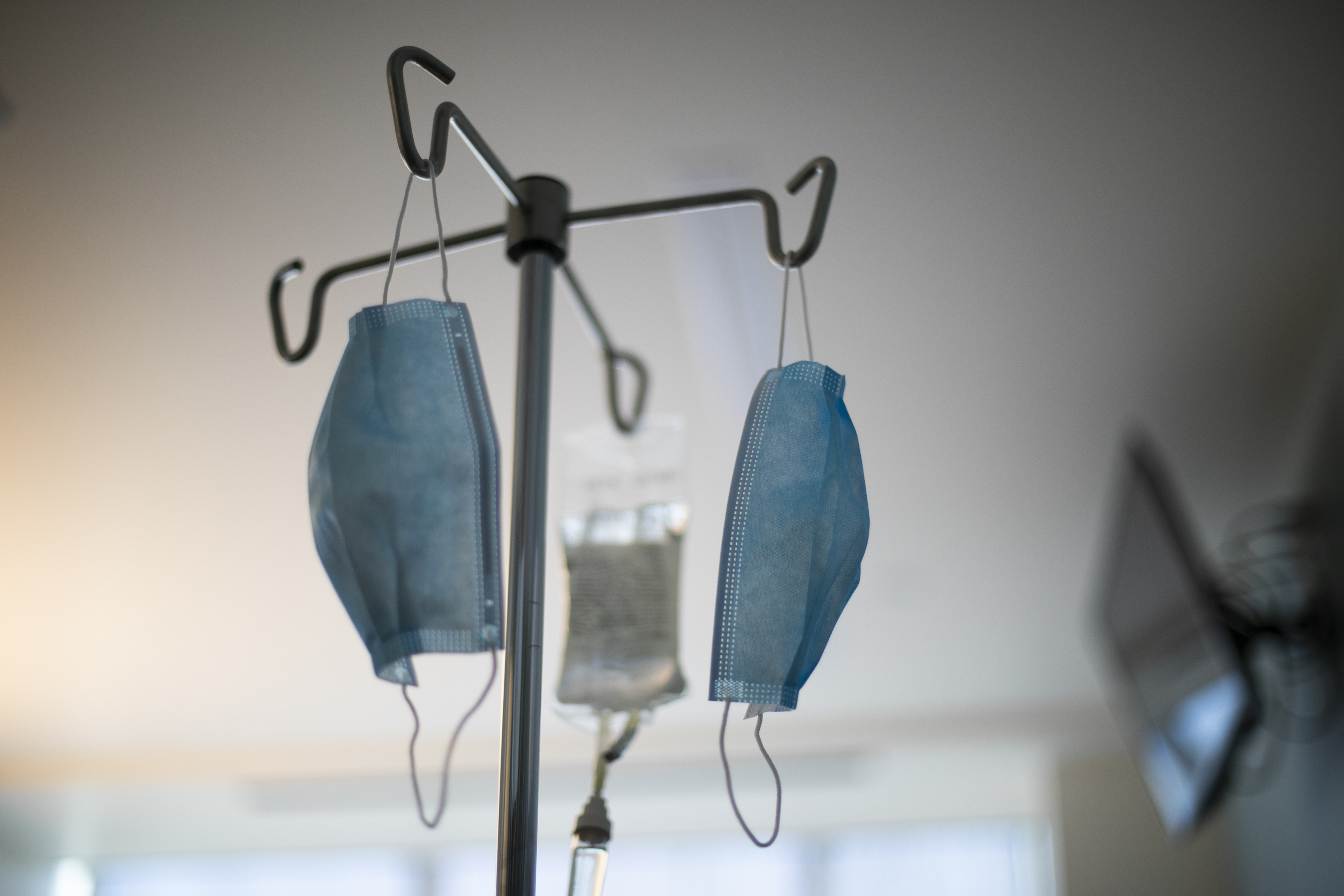
A patient receives an IV drip as face masks hang from an IV pole at a hospital in Portland, Ore., on Saturday, Aug. 8, 2020. Nurses and doctors in Oregon say they are finding little relief with coronavirus infections spreading at record levels, taxing the capacity of many hospitals.
Jenny Kane / AP
SALEM, Ore. (AP) — Working long shifts while trying to save coronavirus patients without getting sick themselves, health care workers are facing incredible stress as the Thanksgiving holiday approaches.
With coronavirus infections spreading at record levels, taxing the capacity of many hospitals, nurses and doctors in Oregon say they are finding little relief.
“In addition to the challenges of working on the front lines of a pandemic, nurses are also confronting the same challenges everyone in their community does. That means daycare and school closures, personal health risks. In southern Oregon — wildfires, sick family members. And they’re just exhausted," said Kevin Mealy, spokesman for the Oregon Nurses Association.
An interview with an emergency room nurse in Oregon gives a picture of what kind of strains they're working under.
He spoke on condition of anonymity to avoid possible retaliation. Mealy said hospitals have threatened to discipline or fire nurses who discuss hospital operations during the pandemic.
For the nurse, Thanksgiving will be another grinding, and dangerous, workday as he continues to pull long shifts at Asante Rogue Regional Medical Center, in Medford, Oregon, to fill staffing gaps.
The hospital was already short-staffed because nurses are hard to find, and fewer traveling nurses are available because of the pandemic, he said. Plus, almost 10% of the emergency room nurses, nurse practitioners and doctors at the hospital have become infected with COVID-19, he said.
Once his shift ends, he disposes of his personal protective equipment — which he said there is a good supply of — and drives home, where he finds it almost impossible to relax.
He can't go out. He can't see his grown daughter or his mother. Indoor service at restaurants and bars is prohibited under a state-wide lockdown, and gyms are closed.
Even if they were open, he'd avoid going.
“I have to self-quarantine because I’m exposed to COVID nonstop. So it would be irresponsible of me to go around other people, except for essential groceries and stuff,” he said. “You’re working 12-hour shifts and then you’re at home, and for sleep pretty much.”
The Oregon Health Authority on Thursday reported the state’s largest daily number of confirmed cases, most daily deaths and people hospitalized for the virus. There were 1,225 new confirmed COVID-19 cases increasing the state total to 60,873. There were 20 new deaths reported, surpassing the 800 since the start of the pandemic.
Even at home, the job intrudes for the nurse.
In the 380-bed hospital, alarms are constantly going off as patients' oxygen levels drop or their blood pressure changes.
Those alarms haunt him in his sleep. He hears them in his dreams and they jolt him awake.
“That kind of stress of having to be at work all the time, it doesn’t go away,” he said.
The nurse said his emergency room is very busy, handling up to 40 patients at a time who show COVID-19 symptoms. They are swabbed and X-rayed, he said.
Overflow patients are being sent to a medical surgical floor. The hospital's critical care unit has 15 beds, and seven are currently occupied by COVID-19 patients who are intubated, the nurse said.
Managers of the medical center are increasing staffing levels to accommodate the influx of patients, Amanda Kotler, vice president of nursing, told KTVL, a Medford TV station.
Mealy said the public should take heed of what's happening in the hospitals, and take precautions like wearing a mask, washing hands and keeping social distance.
“Imagine working 12 hours a day, every day, on your feet, short-staffed, you’re breathing through a mask, and you have the mental strain of dealing with life-and-death situations over and over and over again,” the union spokesman said.


